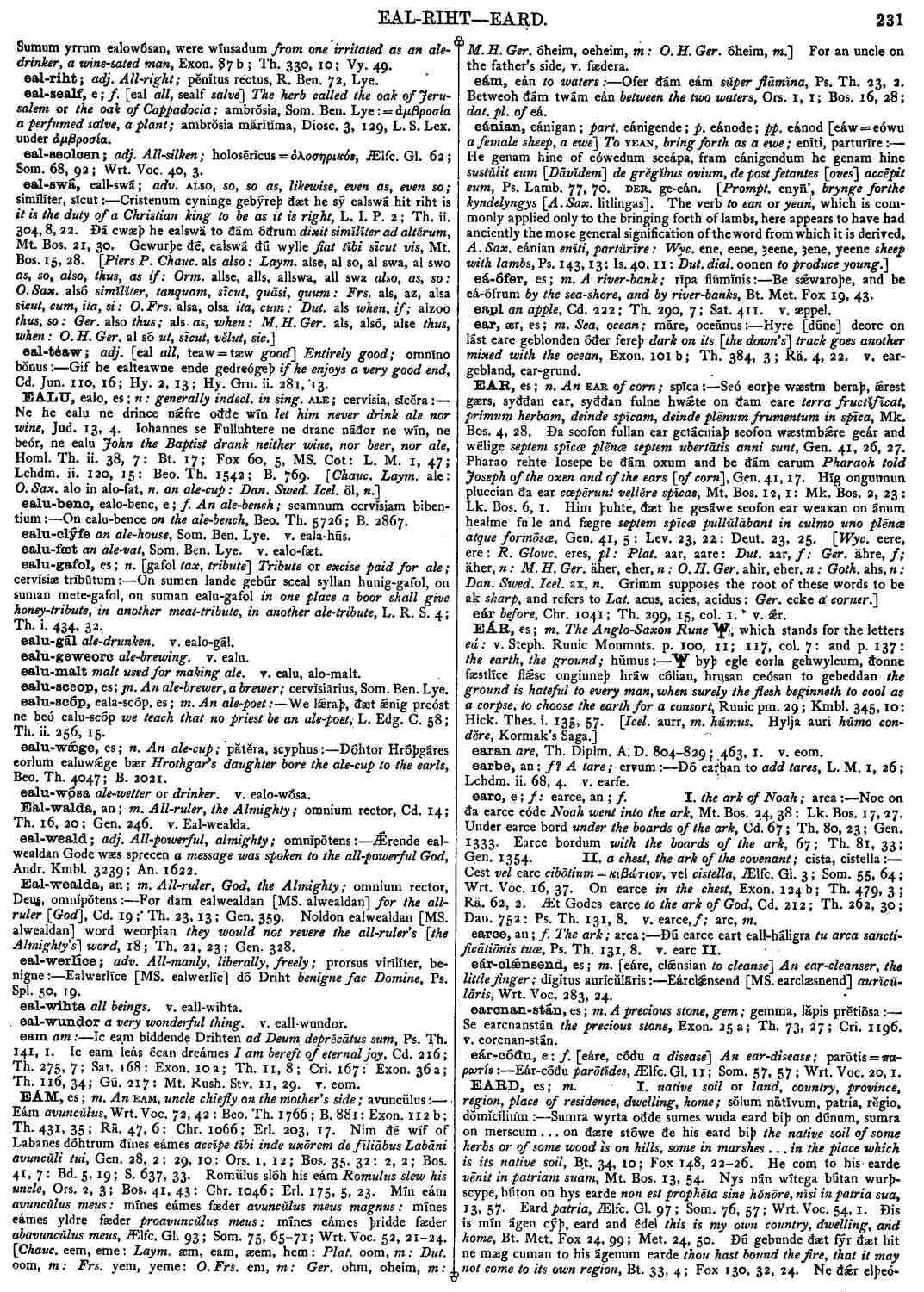EARD
- noun [ masculine ]
-
Sumra wyrta oððe sumes wuda eard biþ on dúnum, sumra on merscum ... on ðære stówe ðe his eard biþ
the native soil of some herbs or of some wood is on hills, some in marshes ... in the place which is its native soil,
- Bt. 34, 10;
- Fox 148, 22-26.
-
He com to his earde
vēnit in patriam suam,
- Mt. Bos. 13, 54.
-
Nys nán wítega bútan wurþ-scype, búton on hys earde
non est prophēta sine hŏnōre, nĭsi in patria sua,
- 13, 57.
-
Eard patria, Ælfc. Gl. 97; Som. 76, 57;
Wrt. Voc.
- 54, 1.
-
Ðis is mín ágen cýþ, eard and éðel
this is my own country, dwelling, and home,
- Bt. Met. Fox 24, 99;
- Met. 24, 50.
-
Ðú gebunde ðæt fyr ðæt hit ne mæg cuman to his ágenum earde
thou hast bound the fire, that it may not come to its own region,
- Bt. 33, 4;
- Fox 130, 32, 24.
-
Ne ðǽr elþeó-dige eardes brúcaþ
strangers enjoy no dwelling there,
- Andr. Kmbl. 560 ;
- An. 280 .
-
Earda leás
deprived of dwellings,
- Cd. 128 ;
- Th. 163, 29;
- Gen. 2705 .
-
Earda sélost
happiest of dwellings [heaven ],
- Hy. 7, 29;
- Hy. Grn. ii. 287, 29: Exon. 42 a ;
- Th. 141, 16;
- Gú. 628: 36 b ;
- Th. 120, 7;
- Gú. 268 .
-
Fífel-cynnes eard
the dwelling of the Fifel race,
- Beo. Th. 209 ;
- B. 104 .
-
Of ðan heofon-fugelas healdaþ eardas
super ea volucres cœli habĭtābunt,
- Ps. Th. 103, 11.
-
Eard gemunde
he remembered his home,
- Beo. Th. 2263 ;
- B. 1129 .
-
He gefæstnude foldan staðelas, eorþan eardas
he made fast foundations of the ground, the firm places of the earth,
- Ps. Th. 103, 6.
-
Eard git ne const frécne stówe, ðǽr ðú findan miht secg
thou dost not yet know the land, perilous place, where thou mayest find the man,
- Beo. Th. 2759 ;
- B. 1377: Exon. 38 b ;
- Th. 128, 4;
- Gú. 399: 129 a ;
- Th. 495, 20;
- Rä. 85, 6.
-
Lǽt nú gebídan on earde
let us now abide on land,
- Andr. Kmbl. 799 ;
- An. 400 .
-
From hróf eardes
a summo teræ.
- Mk. Lind. War. 13, 27.
-
Gǽst and líc geador síðedan on earde
soul and body journeyed together on earth,
- Exon. 76 a ;
- Th. 285, 16;
- Jul. 715 .
-
Fundiaþ ǽlc gesceaft ðider swíðost, ðider his eard and his hǽlo swíðost bióþ
every creature chiefly tends thither, where its station, and its health especially is,
- Bt. 34, 11;
- Fox 150, 22.
-
Man us tyhhaþ twegen eardas, Drihtenes áre oððe deófles þeówet
two conditions are appointed to us, the glory of God or bondage of the devil,
- Hy. 7, 97;
- Hy. Grn. ii. 289, 97.
Bosworth, Joseph. “EARD.” In An Anglo-Saxon Dictionary Online, edited by Thomas Northcote Toller, Christ Sean, and Ondřej Tichy. Prague: Faculty of Arts, Charles University, 2014. https://bosworthtoller.com/8581.
Checked: 1